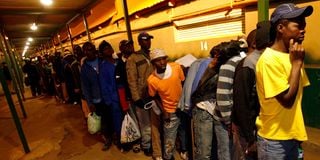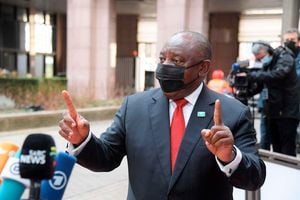
In this file photo, Zimbabwean immigrants wait to be deported from the Lindela Repatriation Centre outside Johannesburg.
South Africa and Zimbabwe could enter a new tiff after Pretoria announced an intensified crackdown against undocumented immigrants.
Thousands of immigrants have been arrested and sent back to their countries since the ANC formed a new government with the opposition Democratic Alliance (DA) and other opposition parties in July. The set-up followed the May elections where the ANC, which has been in power since 1994, performed dismally.
Now South Africa’s new Home Affairs minister, Mr Leon Schreiber from the DA, has adopted a tough stance against illegal immigrants, with raids on businesses that employ undocumented immigrants now a common occurrence. Most of them are Zimbabweans.
Mr Schreiber has pledged to increase inspections at mines, farms, restaurants and informal shops by 50 percent to account for foreigners that are illegally employed.
“Those inspections are most effective when done in collaboration with other departments such as Employment and Labour, the police and local government,” he said.
Zimbabwe, which has the highest population of immigrants in one of Africa’s biggest economies, is already feeling the pressure with the prospects of its citizens being forcibly returned in large numbers for the first time in 15 years.
Strong push to send immigrants back home

A South African Home Affairs employee shows some of the hundreds of Zimbabweans queueing outside the Wynberg office of the Ministry of Home Affairs where to go, in Cape Town on December 31, 2010. At the time, the Zimbabweans were given until midnight on December 31, 2010 to apply for one of several permits that would allow them to stay in the country, and work, for at least 4 years.
South Africa halted the mass deportation of Zimbabweans in 2009 when it introduced special permits that allowed undocumented immigrants from its neighbour to regularise their stay.
There are 178,000 Zimbabwe Exemption Permit (ZEP) holders, but this special dispensation is set to expire next year amid a strong push to send the immigrants back home.
Ahead of the expiry of the ZEP permits, South Africa has started targeted foreigners that do not have permits to remain in the country for immediate deportation.
Zimbabwe’s Public Service deputy minister Mercy Dinha said the country was working with the International Organisation for Migration (IOM) to facilitate the return and reintegration of the deportees.
The minister said reception and support centres were being renovated at southern Africa’s busiest port of entry in Beitbridge and on Zimbabwe’s border with Botswana in Plumtree.
“The government of Zimbabwe, working with the International Organisation of Migration, has laid a foundation for the receipt of migrants in anticipation of the return of Zimbabwe Exemption Permit non-holders from South Africa,” Mrs Dinha said.
The IOM, which tracks cross border migration, reported that at the height of the Covid-19 pandemic, more than 200,000 Zimbabwean immigrants returned from South Africa due to lack of economic opportunities.
Hot issue
Immigration is a hot issue in South Africa, with some political parties that joined the ANC in the new government calling for tougher action against illegal immigrants in the country.
There are also vigilante groups such as Operation Dudula that are hounding out immigrants from their homes and businesses.
Some South Africans blame foreigners for high unemployment and this has seen xenophobic attacks against them flaring up.
Results of South Africa’s 2022 census showed that there were 1 million Zimbabweans living in the country, translating to 45 percent of the migrant population.
Meanwhile, former South African president Thabo Mbeki says the influx of foreigners cannot be blamed for the country’s economic problems.
Mr Mbeki, who was in power when South Africa was hit by one of the worst bouts of xenophobic attacks in 2008, said the country must enforce immigration laws to deal with the problem of illegal immigrants.
“I am a former president of this country and you will never ever convince me that this economy is in crisis because of foreigners. It’s not true,” he told students in Pretoria last Wednesday.
Zimbabweans have been flocking to South Africa to seek jobs even before the end of apartheid, but the numbers have been increasing exponentially since the turn of the millennium because of Harare’s worsening economic problems.







